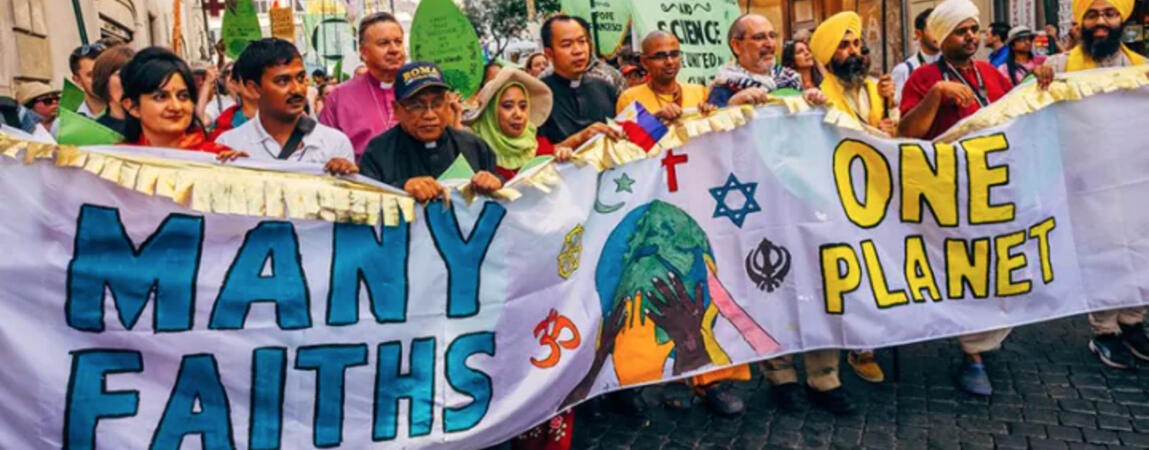Scroll down to find out more about each course, or, if you already know you want to register, these links will take you directly to the individual courses on Coursera.

introduction to religions and ecology
indigenous religions and ecology
south asian religions and ecology
east asian religions and ecology
western religions and ecology
christianity and ecology

These courses explore the ecological dimensions of the world’s religions. They draw on a rich variety of lectures, videos, readings, and interviews with scholars, religious leaders, and environmental practitioners from around the world. Highlighted are religious ideas and practices inspiring ecojustice movements in response to the challenges of the climate emergency, biodiversity loss, and pollution.
While Mary Evelyn Tucker and John Grim have taught these courses at Yale University, they have been adapted for learners from a wide range of backgrounds.
There are 6 courses in the series. You may choose to take just one, and they may be taken in any order, but we do recommend that the introductory course be taken first to provide context for navigating the other courses.
Introduction to Religions and Ecology
At first glance the fields of religion and ecology may seem and unlikely pairing, but a deeper consideration reveals the two have a great deal to contribute to one another and are indeed inextricably linked. Religions recognize the unity and interdependence of humans with nature. Ecological sciences affirm this deep interconnection with the natural world. This partnership can inspire work for the wellbeing of the Earth community . There is a need for broader literacy and deeper knowledge of the world’s religions and their ecological contributions. This series, starting with this course, contributes such a perspective. Each course celebrates the vitality of religiously-informed action for the Earth and recognizes the longstanding contributions of Indigenous peoples in offering visions and practices for ecological flourishing.
This course is part one of the “Religions and Ecology: Restoring the Earth Community” series of classes that focuses on the ecological dimensions of religious traditions throughout the world. This course is designed as a gateway to the other classes. It describes the nature of religion as well as the emergence of the field of ecology. In addition, it highlights concerns for forestry issues, the climate emergency, global ethics, and environmental justice. These courses are for lifelong learners curious to know more about world religions and ecology, environmental professionals eager to deepen the discourse of environmental protection and conservation, those working with non-profit organizations and NGOs on issues of ecological justice, and religion leaders and laity who wish to know how they can contribute to interreligious dialogue on environmental projects.
This course contains many lectures on a wide variety of topics by Mary Evelyn Tucker, John Grim, and others, and includes an original interview with Thomas Lovejoy.
View the full course syllabus.
Register for the course.
Indigenous Religions and Ecology
This course is designed as a gateway to the significant contributions of Indigenous peoples of Africa, Asia, the Americas, and Pacific Regions for environmental understanding. The diversity of Indigenous communities around the planet makes selective coverage necessary, but shared patterns of resilience manifest themselves worldwide. So much has emerged in the last several decades in understanding traditional environmental knowledge, as you will see.
The course includes original interviews with: Tiokasin Ghosthorse, Victoria Tauli-Corpuz, Melissa Nelson, Jeanette Armstrong, Miguel Astor-Aguilera, Ana Mariella Bacigalupo, Jacob Kehinde Olupona, Jesse N.K. Mugambi, Charisma K. Lepcha, Dan Smyer Yu, Kerry Arabena, and Krushil Watene.
View the full course syllabus.
Register for the course.
South Asian Religions and Ecology
This course is designed as a gateway to these aspects of the South Asian religions, philosophies, and practices of Hinduism, Jainism, Yoga, Buddhism, Sikhism, and Baha’i Faith.
This course contains original interviews with: Sunil Amrith, Prasenjit Duara, David Haberman, Acharya Shrivasta Goswami, and Pasang Yangjee Sherpa.
View the full course syllabus.
Register for the course.
East Asian Religions and Ecology
This course is designed as a gateway to these aspects of the East Asian religions, philosophies, and practices of Confucianism, Daoism, Buddhism, Shinto, and Shamanism.
This course contains original interviews with: Mayfair Yang, Annping Chin, Chen Xia, Alicia Kohn, James Miller, Dekila Chungyalpa, and Munemichi Kurozumi.
View the full course syllabus.
Register for the course.
Western Religions and Ecology
This course is designed as a gateway to the environmental aspects of the three primary Western religions of Judaism, Christianity, and Islam.
This course contains original interviews with: Joshua Ratner, Willie Jennings, Melanie Harris, and Everett Gendler.
View the full course syllabus.
Register for the course.
Christianity and Ecology
This course is designed as a gateway to these aspects of the three Western religions of Judaism, Christianity, and Islam.
This course contains original interviews with: Matthew Riley, Stephanie Johnson, Willie Jennings, and Melanie Harris.
View the full course syllabus.
Register for the course.

